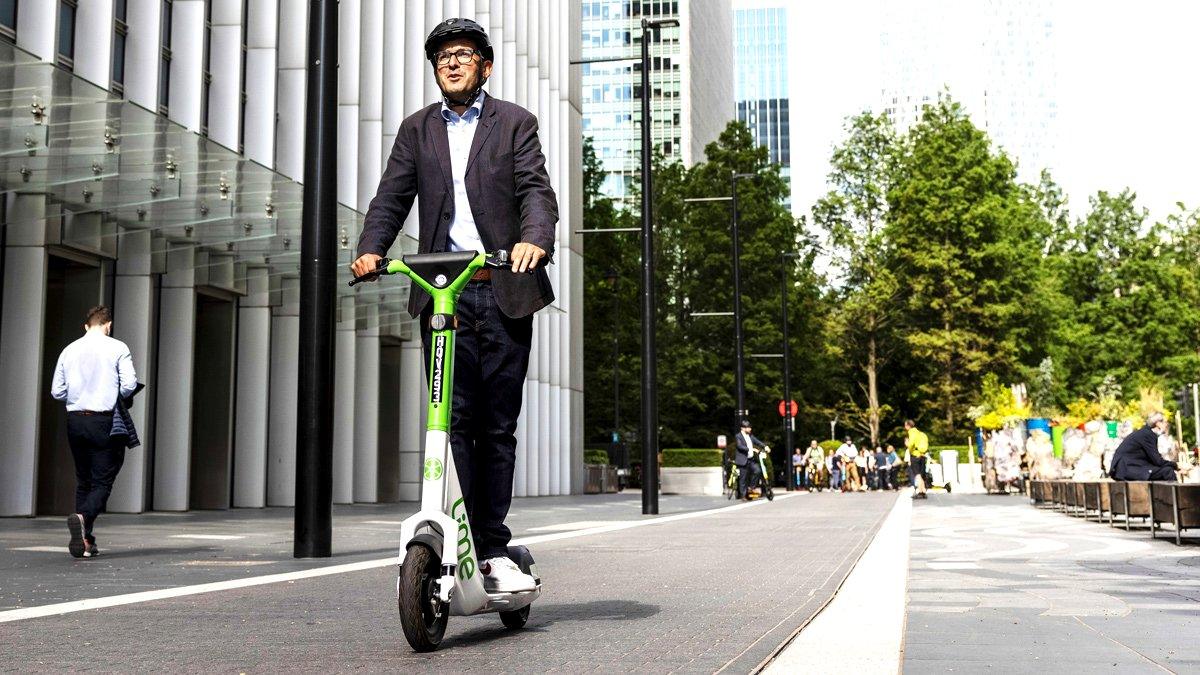Rental e-scooters to be made legal on roads in Great Britain from Saturday
- Published
- comments
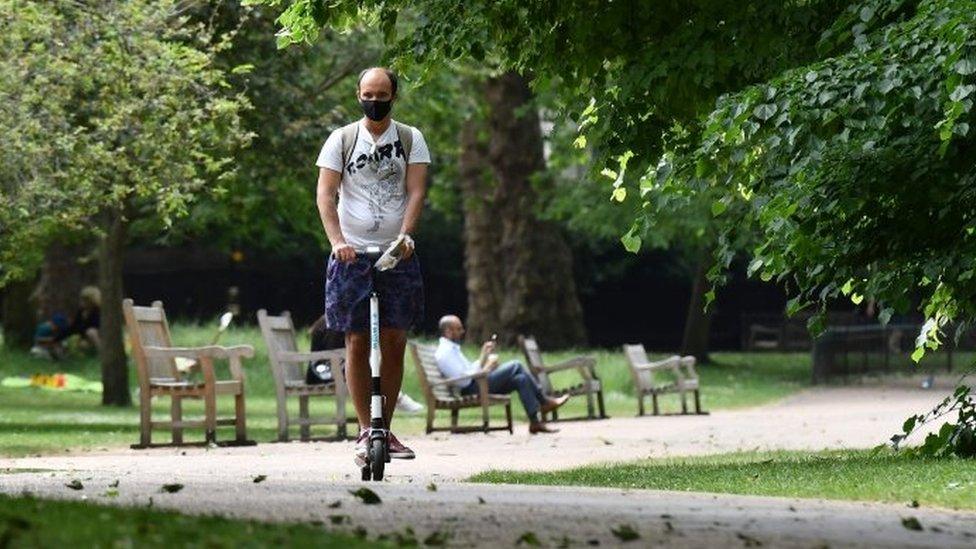
E-scooter firms say the vehicles are an "ideal" way to travel outdoors during the coronavirus pandemic
Rental e-scooters will become legal on roads in Great Britain from Saturday, in a bid to ease pressure on public transport amid the coronavirus crisis.
The Department for Transport (DfT) said the first rentable e-scooters could be available next week, as it published guidance for e-scooter-for-hire firms, external.
The vehicles are banned on pavements, will be limited to 15.5mph and it is recommended that riders wear helmets.
Privately owned e-scooters remain illegal on roads.
Under the new rules set out by the DfT, local authorities and devolved administrations in England, Scotland and Wales can allow or run e-scooter sharing schemes in their areas as part of 12-month trials.
Riders will need a full or provisional car, motorcycle or moped licence to use the vehicles, and they must be aged 16 or over.
It is hoped the first rentable e-scooters could be up and running in Middlesbrough from early next week, said BBC transport correspondent Tom Burridge.
Transport Minister Rachel Maclean said the trials would allow the government to test whether e-scooters could offer "clean and cost-effective travel that may also help ease the burden on the transport network, provide another green alternative to get around and allow for social distancing".
Some 50 local authorities have expressed an interest to the government in having e-scooter trials.
Scooter-sharing schemes have previously faced criticism over dumped scooters, which have been a problem in Paris, so local authorities will need to establish rules to avoid vehicles being abandoned on pavements.
The DfT said in a statement that the regulations only cover rental schemes "to avoid a flood of poor-quality scooters onto the streets".
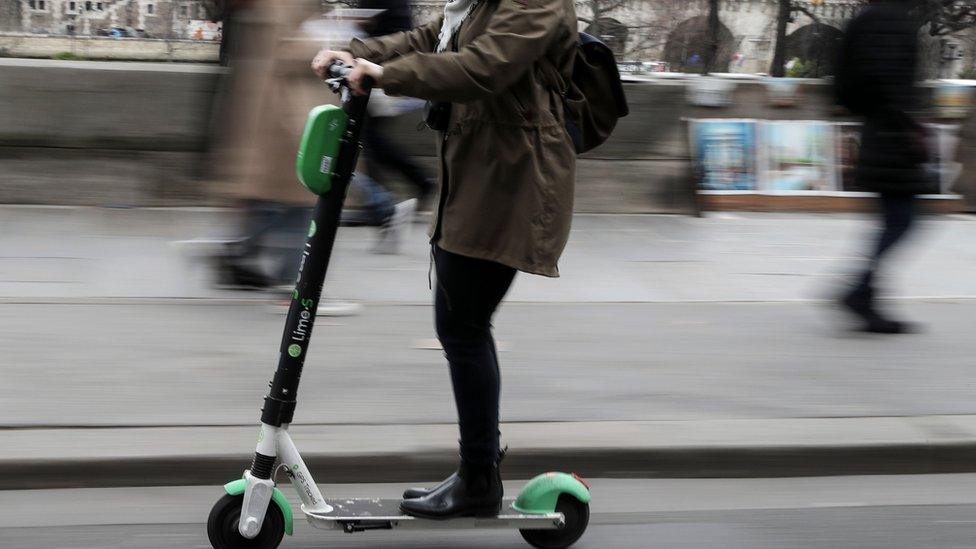
Electric scooters for hire have already become a familiar sight in European and US cities
E-scooter firms vying for licences in UK towns and cities, such as Voi, Spin and Bird, say the vehicles offer an environmentally-friendly alternative to short car journeys.
But campaigners have warned they could become trip hazards and pose a risk to vulnerable pedestrians.
There are also fears the trials will be taken as a "green light for individuals to purchase and use their own e-scooters on public roads and elsewhere," according to the Parliamentary Advisory Council for Transport Safety (PACTS).
'Enormous trip hazard'
Disability awareness campaigner Deborah Farley-Persaud, who is registered as blind and uses a white cane, told the BBC she fears rental e-scooters could obstruct the pavement, creating "an enormous trip hazard", having previously encountered issues with dockless e-bike schemes in London.
She also said she finds e-scooters "frightening because you can't hear them and you can't see them".
Mrs Farley-Persaud, 51, from Islington, in north London, said she has had numerous encounters with e-scooters when travelling around the city and was injured last year following a collision with an e-scooter on a pedestrian underpass in Old Street, east London.
She is now concerned about increased use of e-scooters at a time when she does not feel safe to go out and maintain social distancing amid the coronavirus pandemic.
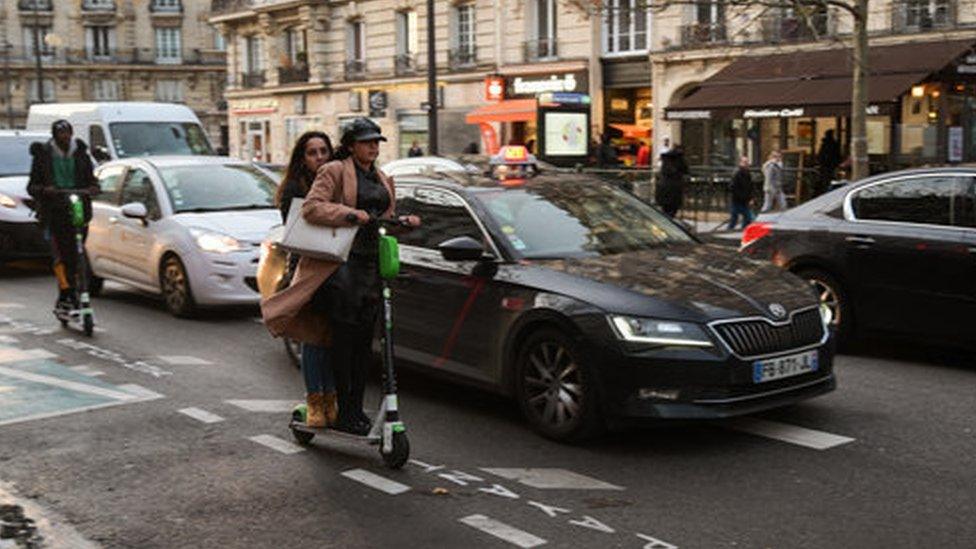
There have been issues with rental e-scooters being left on pavements in European countries such as France
Mrs Farley-Persaud said she has rarely been out during the lockdown, but in the times that she has been she has had "a number of close calls" with e-scooters.
"I was trying to cross the road on Friday and one whizzed past me," she said. "From my husband's description… they clearly hadn't got any regard for the rules of the road, going the wrong way up a one way street."
A recent survey by the Royal National Institute of Blind People (RNIB) found that two-thirds of blind and partially sighted respondents feel less independent now compared to before lockdown, external.
Sarah Lambert, head of social change at RNIB, said "clear enforcement measures" should be put in place to make sure e-scooters are not used on pavements, where they could compound this feeling of less independence.
David Davies, executive director of PACTS, said safety concerns around e-scooters were being "glossed over" and pedestrians would "lose out" from changes to e-scooter rules.
"We are convinced they will be used on pavements. Although there will be regulation, they will be and that's the reality, police don't have the time to regulate that," he said.
The charity, which advises the House of Commons and the House of Lords on air, rail and road safety issues, has called for e-scooter speeds to be limited to 12mph, and said helmets should be made compulsory.
'Convenient' transport
Supporters of the vehicles say they are better for the environment than alternatives, and would help people to move around cities as lockdown restrictions are eased.
Swedish firm Voi is among those hoping to bring them to the UK. It says the vehicles offer a good alternative to public transport as they are ridden out in the open air, where there is less risk of coronavirus transmission.
The firm estimates it could have up to 90,000 e-scooters in towns and cities across the country by the end of the year.
Its chief executive, Fredrik Hjelm, said cities "urgently" need to give people more transport options as traffic returns to UK streets.
"Voi was started with a mission to provide a way of transport that was more convenient and better for our environment than cars, and we have demonstrated across Europe that we can help replace short car journeys of one to three miles with e-scooter trips," he said.
Companies are also taking measures to mitigate the spread of coronavirus. Separate scooter-sharing firms Spin and Bird have both implemented systems where their e-scooters are disinfected when they are collected up for charging.
Bird, which has been operating on the Queen Elizabeth Olympic park since 2018, also said it has street teams that clean scooters in the street.
"Of course the best way to reduce the spread of Covid-19 is travel outdoors and not be in enclosed spaces with others, so scooters are ideal for this," said Harry Porter, from Bird's communications team.

Amy Moore works in sustainable travel at the University of Northampton, where they have been considering e-scooters as an transport option on campus
Amy Moore, 34, from Northamptonshire, is keen to incorporate an e-scooter into her commute to work for environmental reasons and to "reduce congestion which will improve people's commute and therefore quality of life".
She said it was "a good last mile option" for her commute and that rental schemes offered a way to "try before you buy", should privately-owned e-scooters be legalised in future.
Electric scooters have become a familiar sight in US and European cities such as Los Angeles and Paris, where companies including Lime, Bird and Uber have offered the vehicles to hire via a smartphone app.
Such schemes have not been possible in Britain to date, as e-scooters were only legal on private land.
Last month, Transport Secretary Grant Shapps announced a £2bn fund for green transport including e-scooters, external, in a bid to combat overcrowding on public transport amid the coronavirus pandemic.
Originally meant to run in 2021, e-scooter trials were brought forward and broadened to more areas - to encourage people to look at alternative ways to travel over public transport.
The DfT said the rental schemes will involve "leading companies in the industry from Great Britain and across the globe working closely with local authorities to provide a plan for the controlled introduction of e-scooters in cities, towns and rural areas".
Privately owned e-scooters will remain illegal to use on the road, cycle lanes and tracks and pavements.
- Published6 February 2020
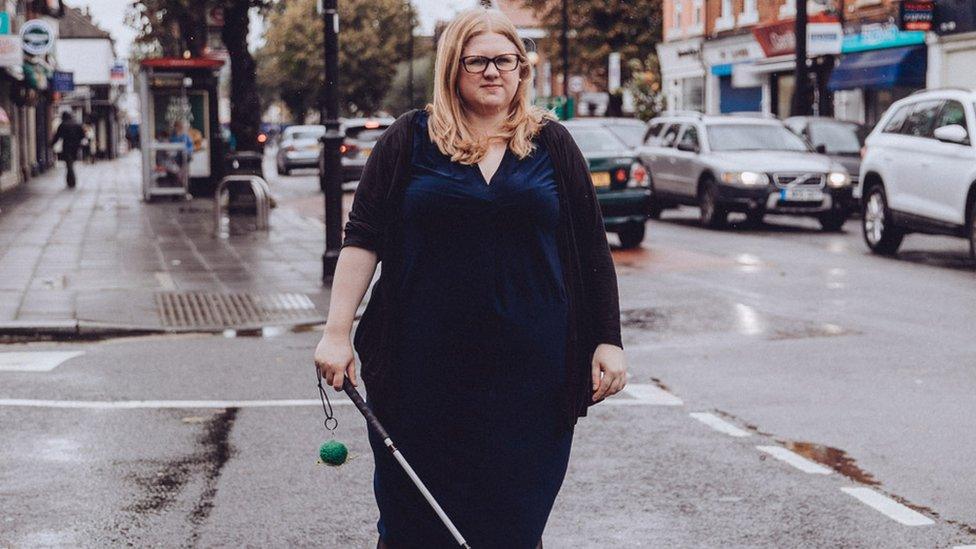
- Published22 March 2022
